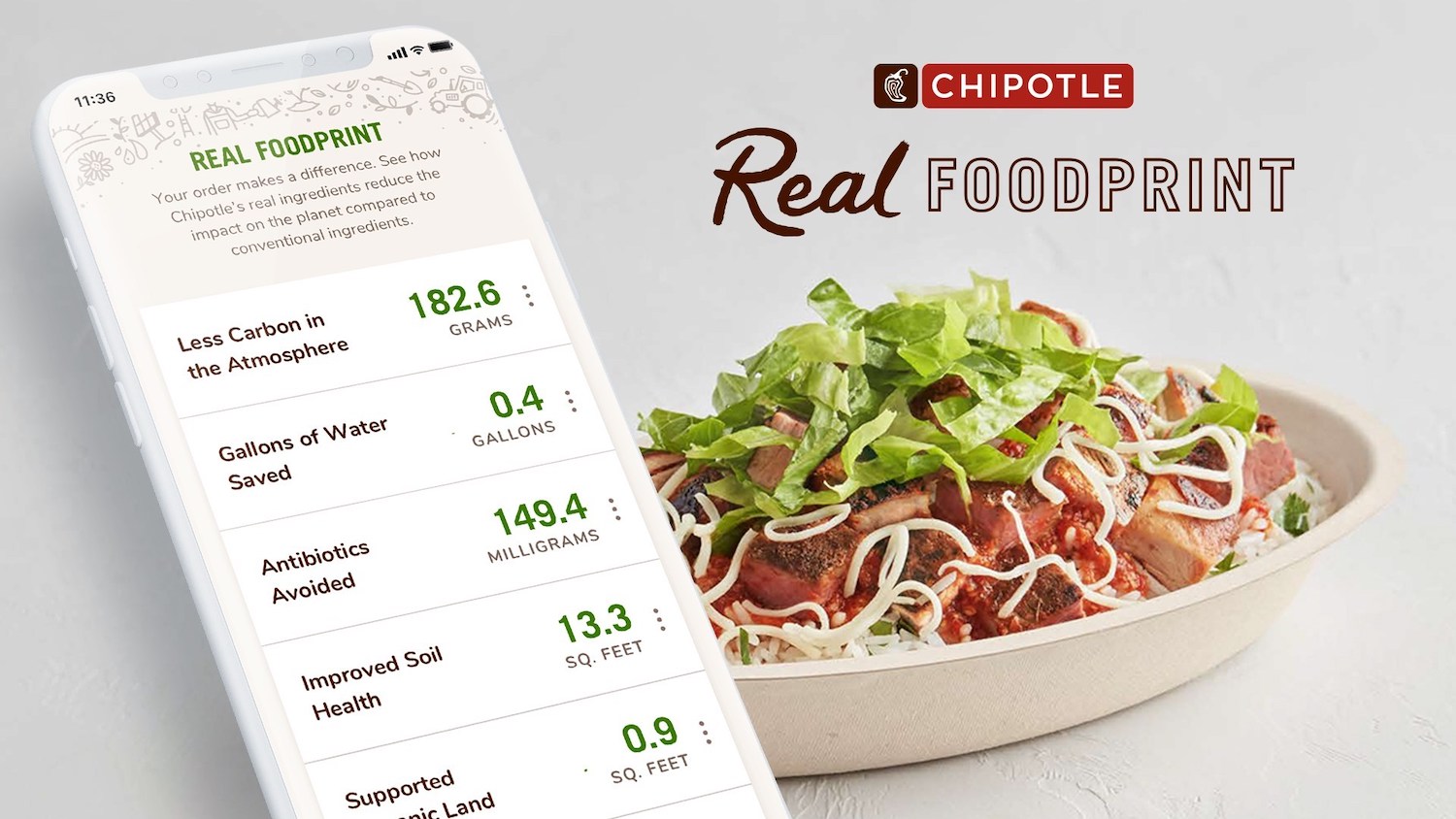
Fast-casual Mexican restaurant chain Chipotle claims to be the first brand to launch a sustainability impact tracker for all digital food orders. Called Real Foodprint, the new feature shows average values for the sustainability and animal welfare impact of all of its 53 ingredients. The company says it hopes that easy access to the new data will allow customers to tweak their orders toward more ethical or sustainable outcomes.
The impact data will appear on the menu on Chipotle's website and customer app. These impact values will be shown next to industry average values for each ingredient, enabling a comparison with conventional ingredients against five key metrics: carbon in the atmosphere saved, water saved, supported organic land, improved soil health and antibiotics avoided.
Customers will also be able to share their order’s impact scores via social media. Bill Nye, the science enthusiast and broadcaster, teamed up with the company to demonstrate the feature in a new TikTok video, showing off how his Chipotle Burrito Bowl measured against the new metrics.
Where does the impact data come from?
In an era of a proliferation of environmental, social and governance (ESG) metrics, knowing the data that companies use is impartial and reliable can be a challenge. In this case, the data used in the Real Foodprint feature is provided by HowGood, an independent research company. HowGood is home to the world’s largest database of sustainability information for products and ingredients, giving Chipotle’s new feature added legitimacy.
The researchers at HowGood collated information from Chipotle’s suppliers and combined it with other data from 450 unique sources. These include peer-reviewed scientific literature and industry research, as well as findings from NGOs and government bodies. This enabled an average impact value to be ascertained for each ingredient.
The average industry baseline values were then established by using data from the U.S. Department of Agriculture and the Food and Drug Administration, as well as from the World Health Organization. Chipotle also aggregated the average percentage of each ingredient used in each menu item.
In a press statement, HowGood’s CEO Alexander Gillett said the new datasets enable a “trailblazing” and truly comprehensive snapshot of each ingredient. Caitlin Leibert, head of sustainability at Chipotle, echoed his sentiment, saying the new feature will enable guests to “make good choices for the planet." Leibert added that the “radical transparency” of the data would also create greater accountability at Chipotle for its impact over time.

A next step for sustainability at Chipotle
On the subject of accountability, Chipotle has been an advocate for a more sustainable agricultural system in the U.S. for decades.
Then-CEO Steve Ells launched Chipotle's “food with integrity” mission statement back in 2001 to address ethical food sourcing. The statement was prompted by an article Ells read at the time on the issue of concentrated animal feeding operations (CAFOs, which are essentially factory farms) — and it ultimately helped define the company’s core values.
The company also has a long track record of emphasizing sustainability and animal welfare in ingredients sourcing. Ells has even testified before the U.S. Congress calling for a reduction in the use of antibiotics in farm animals, so it's no surprise that antibiotic avoidance was chosen as one of Chipotle’s new metrics.
Climate impacts and public health converge
Now more than ever, sustainability and ethical sourcing are hot topics for agriculture and the wider food industry. However, organizations such as the Sustainable Agriculture Network warn that more frequent extreme weather events will put added pressure on farmers to maximize yields. Also, the demand for cheap food still drives industrial farming methods, which increase public health risks, according to organizations like the U.S. Public Interest Group. The group warned in April that factory farm practices provide the perfect breeding ground for the spread of zoonotic viruses, such as the coronavirus, to humans.
The climate crisis and the COVID-19 pandemic have hammered home the issues of human health and sustainability in ways we will never forget. Chipotle’s new ingredients impact feature is therefore auspiciously timed. If Chipotle’s Real Foodprint can move the needle on safer, more sustainable and ethical food choices, even just a little, that’s got to be a good thing.
Images courtesy of Chipotle

James has been writing about investing and sustainable finance and development for over ten years. With a background in sustainability consulting, his book 'Green your business now', was used as the basis for a sustainable business accreditation scheme in the U.K. He also helped PepsiCo with branding and investment strategy for its Tropicana product line as part of its Performance with Purpose agenda. His views on sustainable development and responsible investing have been featured in Morningstar magazine and the UKs Urban Design Journal, an organization that promotes sustainable development. He has an active interest in ESG having written for ESG investor platform Curation, where he helped curate content used in environmental risk briefings for FTSE100 companies. Topics James has covered include governance issues, renewable energy adoption, accessible design, sustainability reporting and climate related financial risk disclosures.














